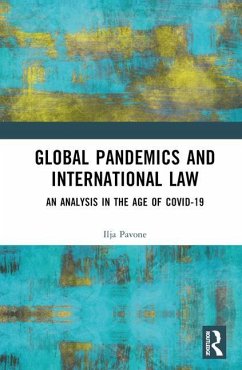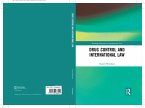- Gebundenes Buch
- Merkliste
- Auf die Merkliste
- Bewerten Bewerten
- Teilen
- Produkt teilen
- Produkterinnerung
- Produkterinnerung
This book reviews the efficacy of Global Health Law, assessing why its legal framework based on the International Health Regulations did not represent a valid tool in the containment of modern global pandemics such as COVID-19. The book provides an introduction to the international legal framework surrounding epidemics and pandemics and the main global governance issues that have been generated by the COVID-19 outbreak. It highlights the main shortcomings of Global Health Law, while also including practical proposals to improve the WHO's mechanism to prevent and respond to future disease…mehr
Andere Kunden interessierten sich auch für
![Drug Control and International Law Drug Control and International Law]() Daniel WisehartDrug Control and International Law42,99 €
Daniel WisehartDrug Control and International Law42,99 €![Challenging Cases in Clinical Research Ethics Challenging Cases in Clinical Research Ethics]() Challenging Cases in Clinical Research Ethics45,99 €
Challenging Cases in Clinical Research Ethics45,99 €![The Skeptical Professional's Guide to Rational Prescribing The Skeptical Professional's Guide to Rational Prescribing]() Charles E. DeanThe Skeptical Professional's Guide to Rational Prescribing111,99 €
Charles E. DeanThe Skeptical Professional's Guide to Rational Prescribing111,99 €![Bioethics Bioethics]() Bioethics121,99 €
Bioethics121,99 €![Global Health Law & Policy Global Health Law & Policy]() Lawrence O GostinGlobal Health Law & Policy161,99 €
Lawrence O GostinGlobal Health Law & Policy161,99 €![Public Health Law Public Health Law]() John CoggonPublic Health Law77,99 €
John CoggonPublic Health Law77,99 €![Public Health Law Public Health Law]() John CoggonPublic Health Law195,99 €
John CoggonPublic Health Law195,99 €-
-
-
This book reviews the efficacy of Global Health Law, assessing why its legal framework based on the International Health Regulations did not represent a valid tool in the containment of modern global pandemics such as COVID-19. The book provides an introduction to the international legal framework surrounding epidemics and pandemics and the main global governance issues that have been generated by the COVID-19 outbreak. It highlights the main shortcomings of Global Health Law, while also including practical proposals to improve the WHO's mechanism to prevent and respond to future disease outbreaks, such as the New Pandemic Treaty. Emphasis is placed on what has not worked in the international, regional and national responses to COVID-19. It is argued that the pandemic has shed light on the weaknesses of global and domestic health law. By identifying legal gaps and providing legal arguments, the book contributes to the historical and conceptual foundation as well as the practical development of international law in the new age of COVID-19, with the ultimate goal of stimulating legal reform in this vital new era. The work will be essential reading for academics, researchers and policy-makers working in International Law, Health Law, Environmental Law, Human Rights Law, Biolaw, and the Law of International Organizations.
Produktdetails
- Produktdetails
- Verlag: Routledge / Taylor & Francis
- Seitenzahl: 250
- Erscheinungstermin: 19. Dezember 2023
- Englisch
- Abmessung: 234mm x 156mm x 16mm
- Gewicht: 453g
- ISBN-13: 9780367608224
- ISBN-10: 0367608227
- Artikelnr.: 68714003
- Herstellerkennzeichnung
- Libri GmbH
- Europaallee 1
- 36244 Bad Hersfeld
- gpsr@libri.de
- Verlag: Routledge / Taylor & Francis
- Seitenzahl: 250
- Erscheinungstermin: 19. Dezember 2023
- Englisch
- Abmessung: 234mm x 156mm x 16mm
- Gewicht: 453g
- ISBN-13: 9780367608224
- ISBN-10: 0367608227
- Artikelnr.: 68714003
- Herstellerkennzeichnung
- Libri GmbH
- Europaallee 1
- 36244 Bad Hersfeld
- gpsr@libri.de
Ilja Richard Pavone is a Researcher of International Law at the National Research Council of Italy, Rome, where he coordinates the research unit in International, European and National Biolaw. He is a member of the Scientific Secretariat of the CNR Research Ethics and Bioethics Committee. He is currently Professor of Research Ethics at University Bicocca, Milan. In the past, he has taught at the universities of Rome (Sapienza), La Tuscia (Viterbo), Venice (Venice International University), Macerata and Siena. He has been Visiting Professor in several universities and research institutions, such as Queensland University, Bochum University and Max Planck Institute for Comparative Public Law and International Law (Heidelberg). He is currently member of the Coordinating Committee of the ESIL Interest Groups on Biolaw and Peace and Security. He is author of over fifty publications, essays and articles in International Law and European Union Law, with a particular focus on Bioethics, Human Rights, Animal Law, Health Law and Environmental Protection. He is also a member of the Scientific Board of the journal "The Future of Science and Ethics", published by the Fondazione Umberto Veronesi. In 2018, he edited a book with Routledge, entitled International Biolaw and Shared Ethical Principles. The Universal Declaration on Bioethics and Human Rights.
Acknowledgments
Preface
CHAPTER I The World Health Organization (WHO) and the global governance of diseases
PART I The Birth of the WHO and the International Health Regulations
1. Introduction
2. The international health regime prior to the creation of the WHO
2.1. The phase of health unilateralism
2.2. The shift of the XX Century
3. The WHO's foundations
4. The WHO's structure and its Institutional Set Up
5. The legal powers of the WHO
6. The International Health Regulations
6.1. Negotiation process
6.2. The all risk approach
6.3. Main duties upon States
6.3.1. Information sharing
6.3.2. Capacity building obligations
7. Soft law instruments
8. Global strategies
PART II The Right to Health and International Law
9. The right to health
10. Health and human rights
11. The international Covenant on Economic, Social and Cultural Rights
12. Sectorial treaties and right to health
12.1. General human rights treaties (at universal or regional scope)
12.2. Regional level
12.3. Biolaw and right to health
13. International jurisprudence
14. Conclusions
CHAPTER II IS THE WHO TRULY INDEPENDENT: SUCCESSES, FAILURES AND PERSPECTIVES OF REFORM
1. Short Overview of WHO's Achievements and Failures
2. The Epidemiological Transition Model
3. WHO declarations of PHEIC
4. Declarations of PHEIC: the WHO's practice
4.1. The pandemic of H1N1 influenza (2009-2010)
4.2. The resurgence of Wild Polio (2014-)
4.3. The case of MERS
4.4. The case of Ebola 2014-2016
4.5. The case of Zika
4.6. The Ebola outbreak in the Democratic Republic of Congo (2019-2020)
4.7. The COVID-19 outbreak
4.8. The Monkeypox outbreak
5. The WHO's lack of enforcement powers
6. How to improve the global health architecture
6.1. The Call for a Reform
6.2. The New Pandemic Treaty
6.3. Advantages
6.4. Drawbacks and other options
7. Conclusions
CHAPTER III THE COVID-19 PANDEMIC AND THE GLOBAL, AND DOMESTIC RESPONSES: WHAT WENT WRONG?
1.Introduction
2.The Levels of Responsibility for the spread of COVID-19
a) The WHO
b) China
c) The Member States
3. The 'Mission Creep' of the WHO
4. In search of the WHO's Responsibilities
4.1. Background
4.2. The meetings of the Emergency Committee of 22-23 January 2020 and the decision not to declare a PHEIC
4.3. What went wrong?
a) The role of the Emergency Committee
b) Design Flaw
5. The Declaration of PHEIC of 30 January 2020 and the measures recommended
6. The Declaration of the Pandemic of COVID-19 as a trigger for domestic pandemic plans
7. Concluding Remarks
CHAPTER IV The Origins of COVID-19, Pandemic Risk, and the Limits of Environmental Law
1. Disease Spillover and environmental degradation
2. Zoonotic Diseases and the Limits of Environmental Law
3. The Gaps of Environmental Law
3.1.Wildlife Law
3.2. Forest Law
4. The Problem of Wet Markets and the Lack of a Global Ban
5. A Global Ban of Wet Markets and the One Health Approach
6. Conclusions
CHAPTER V COVID-19 VACCINES, THE END OF THE PANDEMICS AND UNSETTLED ISSUES
PART I
THE COVID-19 PANDEMIC, VACCINE NATIONALISM AND DISTRIBUTIVE DILEMMAS
1. Introduction
2. The distributive dilemma and vaccine nationalism
3. The necessity of a global roll out of COVID-19 vaccines
4. Overview of Patent Law
4.1. The TRIPS Agreement
4.2. Patent rights vs. public health
4.3. States obligations and global solidarity
5. COVID-19 vaccines and benefit sharing
5.1. Fair and equitable access to COVID-19 vaccines
5.1.1. The Target of Global Health Coverage
5.1.2. COVID-19 Vaccines as a Common Public Good?
6. Specific Declarations on fair and equitable access
6.1. Global level
6.1.1. WHO
6.1.2. United Nations
7. The COVAX initiative
8.Some remarks on the lessons learned by vaccine nationalism
PART II
Mandatory COVID-19 Vaccinations and Human Rights in Europe: how to find a Delicate Balance?
9 .Vaccine Hesitancy
10. A brief history of vaccinations
11. The European model on vaccinations
12. COVID-19 and Mandatory Vaccinations
13. The European legal framework
13.1. The European Union
13.2. The Council of Europe
14. Vaccines and right to life
15. Vaccines and right to private life
16. Vaccines and freedom of thought, conscience and religion
17. Some thoughts on compulsory vaccinations
18. Concluding remarks
CHAPTER VI Infectious diseases as a threat to peace and security and COVID-19: one step behind?
PART I: Framing the issue: infectious diseases and security
1. Introduction
2. New threats to peace and security
3. Resolution 2177/2014 and the securitization of health
4. The conceptual foundation of Resolution 2177
PART II: The Security Council facing the COVID-19 Pandemic
5. The stalemate of the Security Council at the onset of the COVID-19 pandemic
6. Resolution 2532 (2020)
7. The legal nature of Resolution 2532 (2020)
8. Similarities and differences between Resolutions 2177 (2014) and 2532 (2020)
9. Resolution 2565 (2021)
10. Concluding Remarks
Conclusions
Preface
CHAPTER I The World Health Organization (WHO) and the global governance of diseases
PART I The Birth of the WHO and the International Health Regulations
1. Introduction
2. The international health regime prior to the creation of the WHO
2.1. The phase of health unilateralism
2.2. The shift of the XX Century
3. The WHO's foundations
4. The WHO's structure and its Institutional Set Up
5. The legal powers of the WHO
6. The International Health Regulations
6.1. Negotiation process
6.2. The all risk approach
6.3. Main duties upon States
6.3.1. Information sharing
6.3.2. Capacity building obligations
7. Soft law instruments
8. Global strategies
PART II The Right to Health and International Law
9. The right to health
10. Health and human rights
11. The international Covenant on Economic, Social and Cultural Rights
12. Sectorial treaties and right to health
12.1. General human rights treaties (at universal or regional scope)
12.2. Regional level
12.3. Biolaw and right to health
13. International jurisprudence
14. Conclusions
CHAPTER II IS THE WHO TRULY INDEPENDENT: SUCCESSES, FAILURES AND PERSPECTIVES OF REFORM
1. Short Overview of WHO's Achievements and Failures
2. The Epidemiological Transition Model
3. WHO declarations of PHEIC
4. Declarations of PHEIC: the WHO's practice
4.1. The pandemic of H1N1 influenza (2009-2010)
4.2. The resurgence of Wild Polio (2014-)
4.3. The case of MERS
4.4. The case of Ebola 2014-2016
4.5. The case of Zika
4.6. The Ebola outbreak in the Democratic Republic of Congo (2019-2020)
4.7. The COVID-19 outbreak
4.8. The Monkeypox outbreak
5. The WHO's lack of enforcement powers
6. How to improve the global health architecture
6.1. The Call for a Reform
6.2. The New Pandemic Treaty
6.3. Advantages
6.4. Drawbacks and other options
7. Conclusions
CHAPTER III THE COVID-19 PANDEMIC AND THE GLOBAL, AND DOMESTIC RESPONSES: WHAT WENT WRONG?
1.Introduction
2.The Levels of Responsibility for the spread of COVID-19
a) The WHO
b) China
c) The Member States
3. The 'Mission Creep' of the WHO
4. In search of the WHO's Responsibilities
4.1. Background
4.2. The meetings of the Emergency Committee of 22-23 January 2020 and the decision not to declare a PHEIC
4.3. What went wrong?
a) The role of the Emergency Committee
b) Design Flaw
5. The Declaration of PHEIC of 30 January 2020 and the measures recommended
6. The Declaration of the Pandemic of COVID-19 as a trigger for domestic pandemic plans
7. Concluding Remarks
CHAPTER IV The Origins of COVID-19, Pandemic Risk, and the Limits of Environmental Law
1. Disease Spillover and environmental degradation
2. Zoonotic Diseases and the Limits of Environmental Law
3. The Gaps of Environmental Law
3.1.Wildlife Law
3.2. Forest Law
4. The Problem of Wet Markets and the Lack of a Global Ban
5. A Global Ban of Wet Markets and the One Health Approach
6. Conclusions
CHAPTER V COVID-19 VACCINES, THE END OF THE PANDEMICS AND UNSETTLED ISSUES
PART I
THE COVID-19 PANDEMIC, VACCINE NATIONALISM AND DISTRIBUTIVE DILEMMAS
1. Introduction
2. The distributive dilemma and vaccine nationalism
3. The necessity of a global roll out of COVID-19 vaccines
4. Overview of Patent Law
4.1. The TRIPS Agreement
4.2. Patent rights vs. public health
4.3. States obligations and global solidarity
5. COVID-19 vaccines and benefit sharing
5.1. Fair and equitable access to COVID-19 vaccines
5.1.1. The Target of Global Health Coverage
5.1.2. COVID-19 Vaccines as a Common Public Good?
6. Specific Declarations on fair and equitable access
6.1. Global level
6.1.1. WHO
6.1.2. United Nations
7. The COVAX initiative
8.Some remarks on the lessons learned by vaccine nationalism
PART II
Mandatory COVID-19 Vaccinations and Human Rights in Europe: how to find a Delicate Balance?
9 .Vaccine Hesitancy
10. A brief history of vaccinations
11. The European model on vaccinations
12. COVID-19 and Mandatory Vaccinations
13. The European legal framework
13.1. The European Union
13.2. The Council of Europe
14. Vaccines and right to life
15. Vaccines and right to private life
16. Vaccines and freedom of thought, conscience and religion
17. Some thoughts on compulsory vaccinations
18. Concluding remarks
CHAPTER VI Infectious diseases as a threat to peace and security and COVID-19: one step behind?
PART I: Framing the issue: infectious diseases and security
1. Introduction
2. New threats to peace and security
3. Resolution 2177/2014 and the securitization of health
4. The conceptual foundation of Resolution 2177
PART II: The Security Council facing the COVID-19 Pandemic
5. The stalemate of the Security Council at the onset of the COVID-19 pandemic
6. Resolution 2532 (2020)
7. The legal nature of Resolution 2532 (2020)
8. Similarities and differences between Resolutions 2177 (2014) and 2532 (2020)
9. Resolution 2565 (2021)
10. Concluding Remarks
Conclusions
Acknowledgments
Preface
CHAPTER I The World Health Organization (WHO) and the global governance of diseases
PART I The Birth of the WHO and the International Health Regulations
1. Introduction
2. The international health regime prior to the creation of the WHO
2.1. The phase of health unilateralism
2.2. The shift of the XX Century
3. The WHO's foundations
4. The WHO's structure and its Institutional Set Up
5. The legal powers of the WHO
6. The International Health Regulations
6.1. Negotiation process
6.2. The all risk approach
6.3. Main duties upon States
6.3.1. Information sharing
6.3.2. Capacity building obligations
7. Soft law instruments
8. Global strategies
PART II The Right to Health and International Law
9. The right to health
10. Health and human rights
11. The international Covenant on Economic, Social and Cultural Rights
12. Sectorial treaties and right to health
12.1. General human rights treaties (at universal or regional scope)
12.2. Regional level
12.3. Biolaw and right to health
13. International jurisprudence
14. Conclusions
CHAPTER II IS THE WHO TRULY INDEPENDENT: SUCCESSES, FAILURES AND PERSPECTIVES OF REFORM
1. Short Overview of WHO's Achievements and Failures
2. The Epidemiological Transition Model
3. WHO declarations of PHEIC
4. Declarations of PHEIC: the WHO's practice
4.1. The pandemic of H1N1 influenza (2009-2010)
4.2. The resurgence of Wild Polio (2014-)
4.3. The case of MERS
4.4. The case of Ebola 2014-2016
4.5. The case of Zika
4.6. The Ebola outbreak in the Democratic Republic of Congo (2019-2020)
4.7. The COVID-19 outbreak
4.8. The Monkeypox outbreak
5. The WHO's lack of enforcement powers
6. How to improve the global health architecture
6.1. The Call for a Reform
6.2. The New Pandemic Treaty
6.3. Advantages
6.4. Drawbacks and other options
7. Conclusions
CHAPTER III THE COVID-19 PANDEMIC AND THE GLOBAL, AND DOMESTIC RESPONSES: WHAT WENT WRONG?
1.Introduction
2.The Levels of Responsibility for the spread of COVID-19
a) The WHO
b) China
c) The Member States
3. The 'Mission Creep' of the WHO
4. In search of the WHO's Responsibilities
4.1. Background
4.2. The meetings of the Emergency Committee of 22-23 January 2020 and the decision not to declare a PHEIC
4.3. What went wrong?
a) The role of the Emergency Committee
b) Design Flaw
5. The Declaration of PHEIC of 30 January 2020 and the measures recommended
6. The Declaration of the Pandemic of COVID-19 as a trigger for domestic pandemic plans
7. Concluding Remarks
CHAPTER IV The Origins of COVID-19, Pandemic Risk, and the Limits of Environmental Law
1. Disease Spillover and environmental degradation
2. Zoonotic Diseases and the Limits of Environmental Law
3. The Gaps of Environmental Law
3.1.Wildlife Law
3.2. Forest Law
4. The Problem of Wet Markets and the Lack of a Global Ban
5. A Global Ban of Wet Markets and the One Health Approach
6. Conclusions
CHAPTER V COVID-19 VACCINES, THE END OF THE PANDEMICS AND UNSETTLED ISSUES
PART I
THE COVID-19 PANDEMIC, VACCINE NATIONALISM AND DISTRIBUTIVE DILEMMAS
1. Introduction
2. The distributive dilemma and vaccine nationalism
3. The necessity of a global roll out of COVID-19 vaccines
4. Overview of Patent Law
4.1. The TRIPS Agreement
4.2. Patent rights vs. public health
4.3. States obligations and global solidarity
5. COVID-19 vaccines and benefit sharing
5.1. Fair and equitable access to COVID-19 vaccines
5.1.1. The Target of Global Health Coverage
5.1.2. COVID-19 Vaccines as a Common Public Good?
6. Specific Declarations on fair and equitable access
6.1. Global level
6.1.1. WHO
6.1.2. United Nations
7. The COVAX initiative
8.Some remarks on the lessons learned by vaccine nationalism
PART II
Mandatory COVID-19 Vaccinations and Human Rights in Europe: how to find a Delicate Balance?
9 .Vaccine Hesitancy
10. A brief history of vaccinations
11. The European model on vaccinations
12. COVID-19 and Mandatory Vaccinations
13. The European legal framework
13.1. The European Union
13.2. The Council of Europe
14. Vaccines and right to life
15. Vaccines and right to private life
16. Vaccines and freedom of thought, conscience and religion
17. Some thoughts on compulsory vaccinations
18. Concluding remarks
CHAPTER VI Infectious diseases as a threat to peace and security and COVID-19: one step behind?
PART I: Framing the issue: infectious diseases and security
1. Introduction
2. New threats to peace and security
3. Resolution 2177/2014 and the securitization of health
4. The conceptual foundation of Resolution 2177
PART II: The Security Council facing the COVID-19 Pandemic
5. The stalemate of the Security Council at the onset of the COVID-19 pandemic
6. Resolution 2532 (2020)
7. The legal nature of Resolution 2532 (2020)
8. Similarities and differences between Resolutions 2177 (2014) and 2532 (2020)
9. Resolution 2565 (2021)
10. Concluding Remarks
Conclusions
Preface
CHAPTER I The World Health Organization (WHO) and the global governance of diseases
PART I The Birth of the WHO and the International Health Regulations
1. Introduction
2. The international health regime prior to the creation of the WHO
2.1. The phase of health unilateralism
2.2. The shift of the XX Century
3. The WHO's foundations
4. The WHO's structure and its Institutional Set Up
5. The legal powers of the WHO
6. The International Health Regulations
6.1. Negotiation process
6.2. The all risk approach
6.3. Main duties upon States
6.3.1. Information sharing
6.3.2. Capacity building obligations
7. Soft law instruments
8. Global strategies
PART II The Right to Health and International Law
9. The right to health
10. Health and human rights
11. The international Covenant on Economic, Social and Cultural Rights
12. Sectorial treaties and right to health
12.1. General human rights treaties (at universal or regional scope)
12.2. Regional level
12.3. Biolaw and right to health
13. International jurisprudence
14. Conclusions
CHAPTER II IS THE WHO TRULY INDEPENDENT: SUCCESSES, FAILURES AND PERSPECTIVES OF REFORM
1. Short Overview of WHO's Achievements and Failures
2. The Epidemiological Transition Model
3. WHO declarations of PHEIC
4. Declarations of PHEIC: the WHO's practice
4.1. The pandemic of H1N1 influenza (2009-2010)
4.2. The resurgence of Wild Polio (2014-)
4.3. The case of MERS
4.4. The case of Ebola 2014-2016
4.5. The case of Zika
4.6. The Ebola outbreak in the Democratic Republic of Congo (2019-2020)
4.7. The COVID-19 outbreak
4.8. The Monkeypox outbreak
5. The WHO's lack of enforcement powers
6. How to improve the global health architecture
6.1. The Call for a Reform
6.2. The New Pandemic Treaty
6.3. Advantages
6.4. Drawbacks and other options
7. Conclusions
CHAPTER III THE COVID-19 PANDEMIC AND THE GLOBAL, AND DOMESTIC RESPONSES: WHAT WENT WRONG?
1.Introduction
2.The Levels of Responsibility for the spread of COVID-19
a) The WHO
b) China
c) The Member States
3. The 'Mission Creep' of the WHO
4. In search of the WHO's Responsibilities
4.1. Background
4.2. The meetings of the Emergency Committee of 22-23 January 2020 and the decision not to declare a PHEIC
4.3. What went wrong?
a) The role of the Emergency Committee
b) Design Flaw
5. The Declaration of PHEIC of 30 January 2020 and the measures recommended
6. The Declaration of the Pandemic of COVID-19 as a trigger for domestic pandemic plans
7. Concluding Remarks
CHAPTER IV The Origins of COVID-19, Pandemic Risk, and the Limits of Environmental Law
1. Disease Spillover and environmental degradation
2. Zoonotic Diseases and the Limits of Environmental Law
3. The Gaps of Environmental Law
3.1.Wildlife Law
3.2. Forest Law
4. The Problem of Wet Markets and the Lack of a Global Ban
5. A Global Ban of Wet Markets and the One Health Approach
6. Conclusions
CHAPTER V COVID-19 VACCINES, THE END OF THE PANDEMICS AND UNSETTLED ISSUES
PART I
THE COVID-19 PANDEMIC, VACCINE NATIONALISM AND DISTRIBUTIVE DILEMMAS
1. Introduction
2. The distributive dilemma and vaccine nationalism
3. The necessity of a global roll out of COVID-19 vaccines
4. Overview of Patent Law
4.1. The TRIPS Agreement
4.2. Patent rights vs. public health
4.3. States obligations and global solidarity
5. COVID-19 vaccines and benefit sharing
5.1. Fair and equitable access to COVID-19 vaccines
5.1.1. The Target of Global Health Coverage
5.1.2. COVID-19 Vaccines as a Common Public Good?
6. Specific Declarations on fair and equitable access
6.1. Global level
6.1.1. WHO
6.1.2. United Nations
7. The COVAX initiative
8.Some remarks on the lessons learned by vaccine nationalism
PART II
Mandatory COVID-19 Vaccinations and Human Rights in Europe: how to find a Delicate Balance?
9 .Vaccine Hesitancy
10. A brief history of vaccinations
11. The European model on vaccinations
12. COVID-19 and Mandatory Vaccinations
13. The European legal framework
13.1. The European Union
13.2. The Council of Europe
14. Vaccines and right to life
15. Vaccines and right to private life
16. Vaccines and freedom of thought, conscience and religion
17. Some thoughts on compulsory vaccinations
18. Concluding remarks
CHAPTER VI Infectious diseases as a threat to peace and security and COVID-19: one step behind?
PART I: Framing the issue: infectious diseases and security
1. Introduction
2. New threats to peace and security
3. Resolution 2177/2014 and the securitization of health
4. The conceptual foundation of Resolution 2177
PART II: The Security Council facing the COVID-19 Pandemic
5. The stalemate of the Security Council at the onset of the COVID-19 pandemic
6. Resolution 2532 (2020)
7. The legal nature of Resolution 2532 (2020)
8. Similarities and differences between Resolutions 2177 (2014) and 2532 (2020)
9. Resolution 2565 (2021)
10. Concluding Remarks
Conclusions








